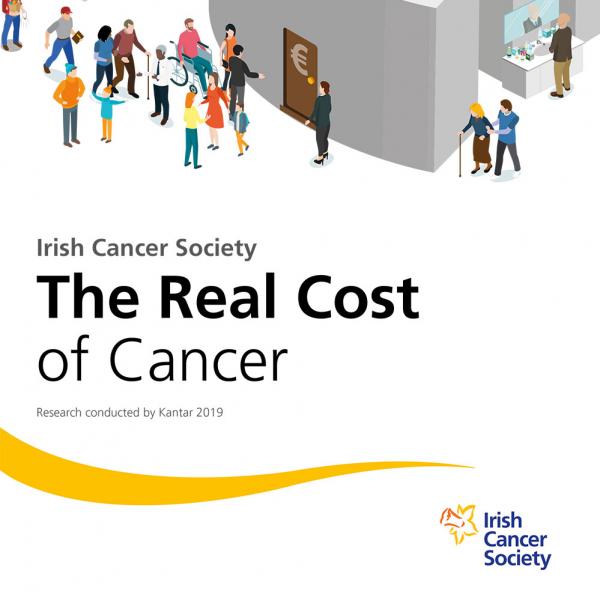About the Real Cost of Cancer campaign

Cancer patients and their families face a financial crisis while they are going through their treatment, according to the results of a 2015 report published based on research we commissioned called ‘The Real Cost of Cancer’.
Survey on the Real Cost of Cancer
The Irish Cancer Society knows that a cancer diagnosis comes with massive additional costs.
In 2019, we published the results of our second Real Cost of Cancer survey to highlight the voices of over 500 cancer patients in Ireland.
Thank you to everyone who took part in this survey. Your participation will help the Irish Cancer Society identify what supports cancer patients need from Government, employers, the HSE and the National Cancer Control Programme.
This is vital information to advocate for change that will reduce the financial impact of a cancer diagnosis.
If you have been affected by the real cost of cancer but didn’t get to take part in this survey, you can share your story with us to help raise awareness about this ongoing issue.
About the Real Cost of Cancer
A large number of patients face a severe drop in income while at the same time running up extra bills on a range of items such as home heating, parking, childcare, travel, prescription charges, hospital stays, over-the-counter drugs, consultant visits, dental care, physiotherapy as well as clothing and personal care.
The average extra spend per month for a cancer patient in 2015 was €862, even for patients with a medical card or private health insurance, according to the survey.
Those who couldn’t work, worked less or lost income as a result of having cancer faced an income drop averaging €1,400 a month, or €16,750 per year.
Four years on, the Irish Cancer Society has published their second research report on the real cost of cancer at the end of 2019:

Overview of the Real Cost of Cancer report
The Real Cost of Cancer report demonstrates the broad range of areas in which cancer patients face new or extra financial challenges.
The research was conducted by Kantar between May and June 2019 using an online survey. At the end of the research period 514 people had participated in the survey.
There was a mix of patients and carers, and from those currently going through treatment and those who are no longer having treatment.
Results include:
Income and challenges in the workplace
- The average drop in the income of cancer patients was €1,527 per month or €18,323 per annum.
- One in three changed their employment status & one in four changed their approach to work.
- 45% of carers’ employment was affected.
Cost of medicines, consultants and parking at the hospital
- The average cost of medicines and medical expenses was just over €261 per month.
- 1 in 10 incurred costs from hospital stays; the average was €288 per month.
- Over a quarter paid consultants’ fees at an average cost of €135 per month.
- GP charges were an additional €81 per month.
- The average costs associated with visiting hospital for appointments or treatment, such as petrol, parking and eating in the hospital was €291 per month.
Additional bills at home
- One in two had additional heating, electricity and telecoms bills.
- A quarter had increased food and drink costs.
- One in eight also had additional childcare costs.
- Over half spent more on personal care and clothing as a result of having cancer.
Medical card and health insurance
- Two in five patients had a medical card at the time of their diagnosis.
- Half received a medical card following diagnosis.
- 17% of those who applied for a medical card were not successful.
- 62% had private health insurance.
Irish Cancer Society recommendations include:
Reduction in the Drug Payment Scheme threshold to €100 per month (family) and €72 (single people).
Abolition of prescription charges for medical card holders.
Abolition of the €80 inpatient charge.
An immediate end to the HSE practice of referring unpaid inpatient charges to debt collectors.
Reduced car parking charges for cancer patients at public hospitals.
Automatic access to a medical card for all cancer patients (currently only under-18s).
Automatic, life-long medical cards for people with a terminal cancer diagnosis.
All cancer patients to have equal access to the provision of bras, prostheses and wigs.
Develop and provide information that helps cancer patients and their families understand and access the support and entitlements available to them.
Investigate the barriers facing cancer patients and survivors in returning to work and make recommendations for change.
For more information
Phone
01 231 0500




